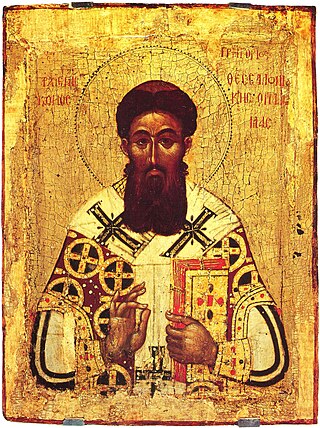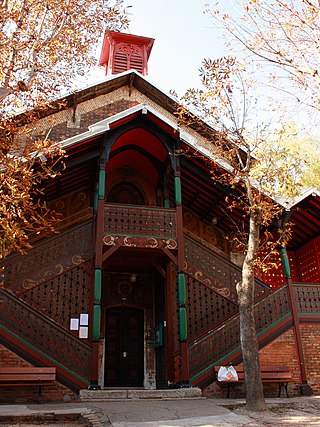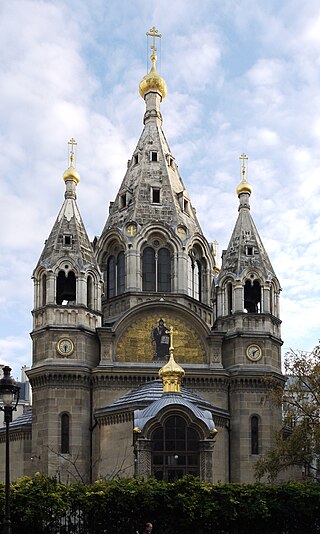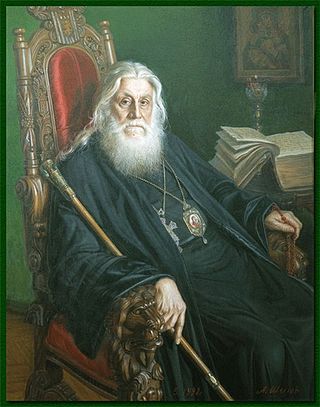Related Research Articles

Alexander Dmitrievich Schmemann was an influential Orthodox priest, theologian, and author who spent most of his career in the United States.

Georges Vasilievich Florovsky was a Russian Orthodox priest, theologian, and historian.

May 11 - Eastern Orthodox Church calendar - May 13

John Meyendorff was a leading theologian of the Orthodox Church of America as well as a writer and teacher. He served as the dean of St. Vladimir's Orthodox Theological Seminary in the United States until June 30, 1992.

Sergei Nikolayevich Bulgakov was a Russian Orthodox theologian, priest, philosopher, and economist. Orthodox writer and scholar David Bentley Hart has said that Bulgakov was "the greatest systematic theologian of the twentieth century." Father Sergei Bulgakov also served as a spiritual father and confessor to Mother Maria Skobtsova.

Vladimir Nikolaievich Lossky was a Russian Orthodox theologian exiled in Paris. He emphasized theosis as the main principle of Eastern Orthodox Christianity.

Sophrony the Athonite, known also as Elder Sophrony or Father Sophrony, was a Russian-born Orthodox Christian archimandrite and one of the most noted ascetic monks of the 20th century. He is best known as the disciple and biographer of Silouan the Athonite and compiler of his works in the classic book Saint Silouan the Athonite, and also as the founder of the Patriarchal Stavropegic Monastery of St. John the Baptist in Tolleshunt Knights, Maldon, Essex, England.

Hilarion is a bishop of the Russian Orthodox Church; currently he is the retired metropolitan of Budapest and Hungary. He is also a theologian, church historian and composer and has published books on dogmatic theology, patristics and church history as well as numerous compositions for choir and orchestra.
Paul L'Huillier was a prominent scholar and the archbishop of the Orthodox Church in America's Diocese of New York and New Jersey.
Western Rite Orthodoxy, also called Western Orthodoxy or the Orthodox Western Rite, are congregations within the Eastern Orthodox tradition which perform their liturgy in Western forms.

The St. Sergius Orthodox Theological Institute in Paris, France, is a private university of higher education in Orthodox theology. Founded in 1925 by a group led by Metropolitan Eulogius Georgiyevsky, historian, theologian, and last Minister of Religious Affairs of the Russian Provisional Government, Anton Kartashev, Lev Liperovsky and Mikhail Ossorguine, with the active support of Nobel Peace Prize recipient John Mott. It is under the canonical jurisdiction of the Archdiocese of Russian Orthodox churches in Western Europe under the omophorion of the Russian Orthodox Church.

The Archdiocese of Russian Orthodox Churches in Western Europe is an archdiocese of the Russian Orthodox Church with special status, headquartered in Paris. It comprises various Russian Orthodox parishes located throughout Western Europe.
Fr. Elie Melia was a Georgian Orthodox priest in France and church historian.

Olivier-Maurice Clément was a French Eastern Orthodox theologian who taught at St. Sergius Orthodox Theological Institute in Paris, France. He actively promoted the reunification of Christians, dialogue between Christians and people of other beliefs, and the engagement of Christian thinkers with modern thought and society.

20th century Eastern Orthodox theology has been dominated by neo-Palamism, the revival of St. Palamas and hesychasm. John Behr characterizes Eastern Orthodox theology as having been "reborn in the twentieth century." Norman Russell describes Eastern Orthodox theology as having been dominated by an "arid scholasticism" for several centuries after the fall of Constantinople. Russell describes the postwar re-engagement of modern Greek theologians with the Greek Fathers, which occurred with the help of diaspora theologians and Western patristic scholars. A significant component of this re-engagement with the Greek Fathers has been a rediscovery of Palamas by Greek theologians; Palamas had previously been given less attention than the other Fathers.

The Saint Petersburg Theological Academy is a higher education institution of the Russian Orthodox Church, located in Saint Petersburg, Russia. The academy preparing theologians, clergymen, singers and icon writers for the Eastern Orthodox Church and grants bachelor, master, candidate and doctorate degrees. It was founded in 1797 by Metropolitan Gabriel (Petrov) of Saint Petersburg, as part of the Alexander Nevsky Lavra.

Job of Pisidia is an Eastern Orthodox Metropolitan of the Ecumenical Patriarchate who is the Permanent Representative of the Ecumenical Patriarchate to the World Council of Churches and the Dean of the Institute for Orthodox Theology Higher Studies at Chambésy, Switzerland. He was the Archbishop of Telmessos and was elected on July 22, 2022, as the new metropolitan of Pisidia.
The Russian Religious Renaissance was a period from roughly 1880 -1950 which witnessed a great creative outpouring of Russian philosophy, theology and spirituality. The term is derived from the title of a 1963 book by Nicholas Zernov called, The Russian Religious Renaissance of the Twentieth Century. The renaissance began in the late nineteenth century but was unexpectedly driven out of Russia due to the violent upheavals of the Bolshevik Revolution and early atheistic Communist regimes. This dislocation led to the resettlement of many Russian intelligentsia in Europe and the West where the renaissance reached its full expression. Although often viewed as a development within the Russian Orthodox world, the spiritual ideals of the Russian Religious Renaissance were carried throughout the wider Eastern Orthodox Church and even into the Roman Catholic and Protestant communities.

Archbishop Nestor is Bishop of the Russian Orthodox Church, Archbishop of Madrid and Lisbon.

Bishop Basil, secular name Vladimir Mikhaylovich Rodzianko was a bishop serving the Orthodox Church in America from 1980 to 1999.
References
- ↑ St Dionysius Institute website, Management page
- ↑ Van Kessel, Josephien H. J. (2023). "Bulgakov's sophiology and the neopatristic synthesis". Studies in East European Thought. doi: 10.1007/s11212-023-09587-1 .
- ↑ Saint Vladimir's Orthodox Theological Seminary website, On “The Mystical Theology of the Eastern Church” , article dated February 1, 2014
- ↑ European History Online website, Orthodox Theology in Western Europe in the 20th Century, article by Ivana Noble and Timothy Noble, Published 2013-07-04
- ↑ Orthodox Church In America website, His Eminence Archbishop Peter, Retired Archbishop of New York and New Jersey, obituary dated November 19, 2007